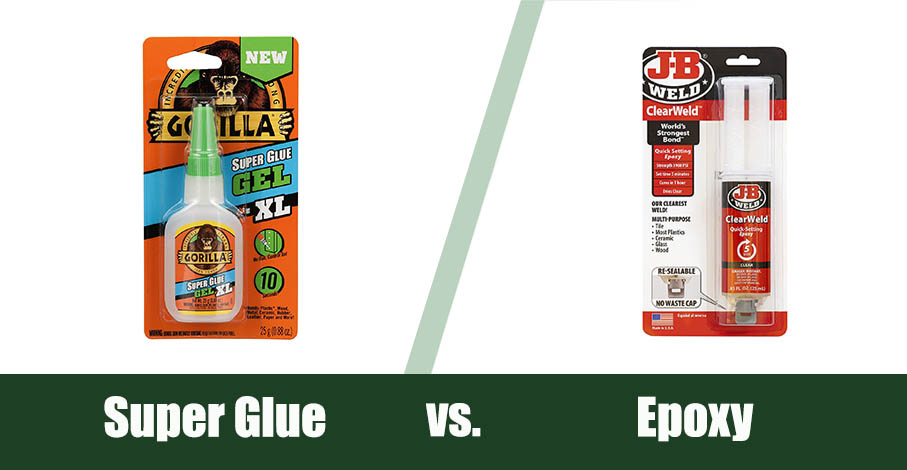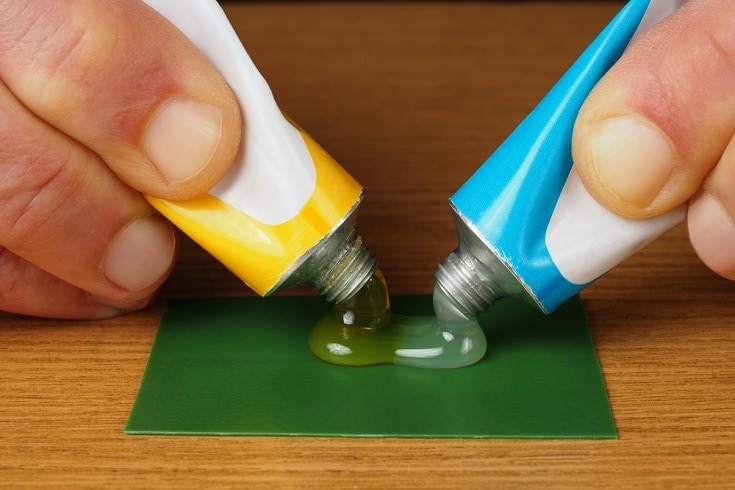Super Glue vs. Epoxy: Which is Right for Your Needs?
-
- Last updated:


On the outside, Super Glue and epoxy may seem like similar materials. Both make a powerful bond and are generally used for holding things together. However, they are used for different projects and are generally better at separate things.
They both excel at what they’re designed for. However, you need to use them for the correct projects, or you may find yourself running into problems. We’ll help you figure out which projects to use each of these glues for in this article.
Overview of Super Glue

Super Glue is a brand name for a specific type of adhesive that is known as cyanoacrylate adhesive. It forms a powerful bond by reacting to moisture in the air and on the surface of whatever it is bonding. There are many different types of Super Glue, also known as fast-acting glue. The particular type you get can be significant, though they are generally all very similar.
Types of Super Glue
There are dozens of types of fast-acting glue out there. We are not going to look at every type on the market, as that could be a whole article in itself. However, we will look at some of the reasons why there are so many types.
One of the main reasons you can purchase so many different variations of Super Glue is material compatibility. Some are better suited for specific materials. A glue that is made for plastics won’t necessarily work on metals, for instance. This can also be due to viscosity and other features. Some are made for particular purposes, while others are more general glues.
Safety
Fast-acting glue will emit fumes while it is curing. These fumes have varying chemical makeups, with some of them being more dangerous than others. You should generally only use Super Glue in ventilated areas, so you breathe in as little of the fumes as possible. Furthermore, you may want to wear a mask for certain fast-acting glue.
It is not often discussed that Super Glue fumes can impact sensitive plastics, obvious ones like those used in car windshields. The fumes can make these plastics a bit cloudy.
Cost
Super Glue is usually very cost-effective. Some types are more expensive than others. However, overall, they tend to be very economical and are cheaper than most alternatives.
- Inexpensive
- Many different types
- Decently safe
- Not suitable for a large surface area

Overview of Epoxy

Epoxy is a two-step hardening adhesive. You put one material on whatever you’re attaching the epoxy and then add another substance called a “hardener.” The process of using epoxy is a little more complicated than using Super Glue. However, there are many benefits to using epoxy that other types of adhesive don’t have.
Epoxies need to cure after both ingredients are mixed. This can take a few minutes to a few hours. Either way, the epoxy usually needs to sit for a few hours after the curing process to reach its full strength. Once hardened, epoxy can be sanded, drilled, and painted.
Types of Epoxy
There are a few different types of epoxies that are made for different purposes.
- Pure Epoxy: this consists of a resin and a hardener. It cures at a slow rate but doesn’t shrink very much and has excellent adhesion. It is powerful but isn’t suitable for low-temperature applications.
- Polyester Resins: this sort of epoxy cures through polymerization, allowing it to be used at low temperatures. This sort of resin is usually used in construction.
- Epoxy Acrylates: often considered the “best” choice, this sort of epoxy cures fast but is also very strong. It is most suited to moist environments or very low temperatures.
Safety
The safety of epoxy is similar to Super Glue. You need adequate ventilation and likely a mask as well. When you use epoxy, you may use a large amount. For this reason, you will need a mask more often with epoxy than you would with fast-acting glues.
With that said, epoxy isn’t significantly more dangerous. They’re both pretty similar in this regard.
Cost
Epoxy can be a bit expensive. It is not as budget-friendly as Super Glue. This is especially true since most people use a lot of epoxy when they do use it, which can push up the cost quite a bit.
- Temperature resistant
- Versatile
- Durable
- Complicated application

Application
The obvious difference between Super Glue and epoxy is the application process. You can simply put Super Glue on whatever you need stuck together and leave it to cure. After a few hours, it will be done. The process is simple and straightforward.
On the other hand, the process of using epoxy can be a bit complicated. You have to add a hardener to it and wait a varying amount of time for it to cure and then harden.
Different Uses
Epoxy is mostly used for coating metal, insulating electronics, and making models. It is more of a solid adhesive – not necessarily for keeping things together.
Super Glue is used on a smaller scale. However, it is also used in industries, but usually for smaller projects.
Safety
You need to use both materials in a well-ventilated area. The fumes can be toxic. For safety reasons, you should also wear gloves and eye protection. You do not want to get either adhesive on your hands or in your eyes.
Super Glue is a bit more dangerous, just because it will bond to tissue immediately. It can also combust spontaneously when it comes into contact with wool or cotton.
Removability
Epoxy is very easy to remove before it hardens. Firstly, you can simply not add the hardener, which will make it not harden, to begin with. If you’ve already added the hardener, you can also remove it with acetone or white vinegar. Once the epoxy hardens, you cannot remove it without basically cutting it away.
Super Glue can be removed with acetone or GBL before and after it hardens. It is a bit less durable because of this, but much easier to remove should you need to.
Strength
Super Glue is very adhesive. It will stick just about everything together. However, it has a very shear strength. That means that you can easily pull the two stuck things apart. It isn’t best for industrial purposes for that reason.
However, epoxy has a very high shear strength. It is better at filling parts between voids for this reason. It is also better in situations where more force might be applied, making it better for industrial situations in general.
Conclusion
Super Glue is usually better for your average homeowner. It is cheaper, easier to remove, and simpler to use. Most homeowners do not need the strength of epoxy. Instead, enjoy the lower cost and ease of use that comes with fast-acting glue.
On the other hand, larger projects call for epoxy. It is better when you need to fill large gaps or want to make another surface you can actually do things with. This is why it is used for industrial purposes and model making. You can drill into epoxy, but you can’t drill into Super Glue.
Featured Image Credit: Left: Super glue: (Image Credit: Glsysrp Wikimedia Commons CC BY-SA 4.0) | Right: Epoxy: (Image Credit: Jake Gallagher, Wikimedia Commons CC BY-SA 3.0)
Contents

